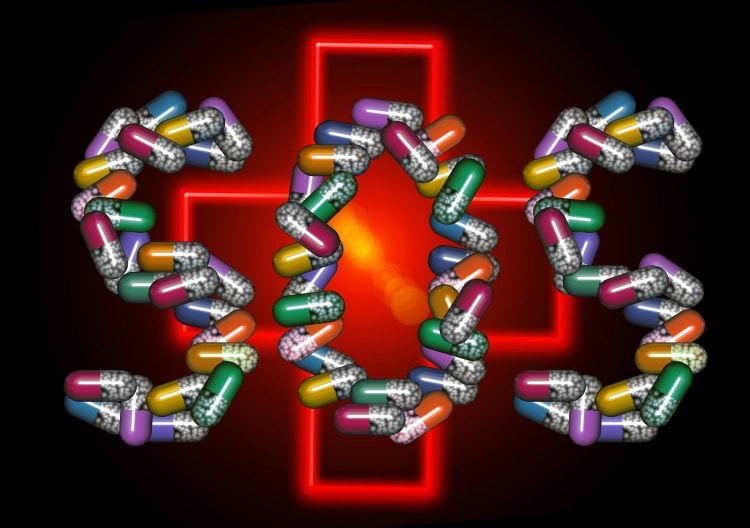Do You Really Have to Take Antibiotics for Strep Throat (and Strep Infection in General)?
Every year, millions of people develop a strep throat (streptococcal pharyngitis) or other streptococcal infections, and thousands of them die from them. Although effective antibiotic treatment is available, many people believe that taking antibiotics for strep throat does not make sense because your immune system can handle these bacteria on its own. But is it true? Here is an evidence-based article explaining why it is necessary to get immediate medical help and take antibiotics for a strep throat.
What is strep infection?
Streptococcal infections are a group of diseases caused by a gram-positive bacteria called Streptococci.
Streptococci are more common than you think. Not only they live around us, but they also colonize the throat, mouth, skin and mucous membranes of virtually all people.
Under normal circumstances, these bacteria will not hurt you, but if your immune system gets weak or you encounter a strain of bacteria that you are not used to, you may develop respiratory, skin, brain and even middle ear infections.
Many people think strep infection is just strep throat, but it's not true. Streptococci may also cause very severe, life-threatening diseases such as pneumonia, meningitis, flesh-eating disease, or streptococcal toxic shock syndrome (1).
Other examples of disorders caused by streptococci include impetigo, erysipelas, middle ear inflammation or tooth decay.
Here is an overview of common diseases caused by streptococci (2).
- Alpha-hemolytic streptococci: Streptococcus pneumonie and Viridans streptococci
- Streptococcus pneumonie: sinusitis (sinus infection), meningitis, otitis media (middle ear infection), peritonitis.
- Viridans streptococci: tooth decay and mild infections in the mouth
- Beta-hemolytic streptococci: Group A and Group B
- Group A beta-hemolytic strep infection (Streptococcus pyogenes): strep throat (streptococcal pharyngitis), impetigo, scarlet fever, toxic shock syndrome, pneumonia, necrotizing fasciitis (flesh eating disease). Complications include rheumatic fever, glomerulonephritis, and PANDAS (pediatric autoimmune neuropsychiatric disorders associated with streptococcal infections).
- Group B beta-hemolytic strep infection (Streptococcus agalactiae): life-threatening pneumonia, meningitis and other serious conditions in the neonates and elderly.
Symptoms of common strep infections
Streptococci cause many diseases. Here is a brief overview of symptoms of the most common ones:
Strep throat (streptococcal pharyngitis)
It is essential to learn to distinguish between a common cold and a strep throat.
Both of these diseases are a throat infection.
However, common colds are much more frequent and are usually caused by viruses.
Antibiotics are useless for a viral infection because they do not work on viruses.
Common symptoms of colds and strep throat are a sore throat and fever, but if you have a cold the pain in your throat will be the same all the time, while strep throat pain increases when swallowing.
As far as the temperature is concerned, it is lower in colds, while in streptococcal infection it exceeds 101 °F (38 °C).
Other symptoms of a strep throat include swollen tonsils, headache, little red spots on the roof of the mouth, nausea, diarrhea, and vomiting.
Sometimes you may only have a part of the symptoms above and still have a strep throat.
The most common strep throat treatment is antibiotics.
Meningitis
Meningitis is a severe disease usually caused by Streptococcus agalactiae (Group B Streptococcus (GBS) meningitis in newborns and elderly) and Streptococcus pyogenes (Group A Streptococcus (GAS) meningitis in sporadic cases)
Symptoms of meningitis include nausea, vomiting, stiff neck, sleepiness, difficulty walking, sensitivity to light and skin rash.
Newborns may also constantly cry, stop eating and have a lump on top of their head (abnormally "swollen" fontanel).
Immediate antibiotic treatment is required for meningitis.
Necrotizing fasciitis
Symptoms of the flesh eating bacteria (or necrotizing fasciitis) include increased pain in the wound on the skin (usually after insect bites, rubbing or open wounds on the skin), redness and an increased temperature of the affected site, flu-like symptoms such as diarrhea, nausea, high fever, confusion, weakness.
Sometimes you may also be very thirsty as a result of dehydration.
Necrotizing fasciitis is a life-threatening disease that requires immediate treatment by a combination of surgical procedure (removal of dead tissue) and antibiotics.
Pneumonia
Streptococcal pneumonia is caused by either Streptococcus pneumoniae (Pneumococcus) or by Group B Streptococcus (GBS or S. agalactiae).
Symptoms of pneumonia may be similar to flu, but patients usually have a productive cough (green to yellow-green mucus), fever (101 °F = 38 °C or higher), excessive sweating, blue discoloration of fingertips and a general feeling of weakness. Loss of appetite, nausea, vomiting, and diarrhea are other common symptoms.
Pneumonia also requires prompt medical attention and antibiotic treatment.
Streptococcal toxic shock syndrome
Streptococcal toxic shock syndrome (TSS) is an invasive Group A Streptococcal infection, which we mostly see in people with severe underlying conditions, such as leukemia, burns, cancer or renal failure.
These people get a corticosteroid treatment, which suppresses their immune system.
Symptoms of TSS include bacteremia (presence of bacteria in the blood), shock, ARDS (Adult Respiratory Distress Syndrome) and renal failure.
Up to 70% of patients die despite modern antibiotic and shock treatments.
Skin diseases caused by streptococci
Scarlet fever, impetigo or erysipelas are conditions caused by streptococci, with skin manifestation.
Their symptoms include fever, nausea, vomiting, redness of affected skin area and a typical rash or pimples.
Symptoms of scarlet fever also include a "strawberry tongue".
Prompt medical attention is necessary, as well as antibiotic therapy.
Why are antibiotics necessary for strep throat and other strep infections?
Untreated streptococcal infections may be dangerous and can even kill you. Therefore, it is important always to seek immediate medical attention if you have any symptoms of strep infection.
Your doctor will perform the necessary examinations (especially throat or skin swab or ASLO blood test) to identify the bacteria that caused the problem.
If your infection is caused by streptococci, your doctor will prescribe you medical drugs, called antibiotics.
Antibiotics are synthetic and natural substances that either kill bacteria or prevent their growth.
Antibiotics that kill bacteria are called bactericidal, and antibiotics that stop bacterial growth are called bacteriostatic.

Antibiotics help your immune system manage a strep infection
If you have a strep infection (or any other bacterial infection), bacteria will begin to replicate quickly in your body and kill your cells. Fortunately, we have an immune system that recognizes these harmful bacteria and starts fighting them.
For example, your immune system increases the temperature of your body and sends out special cells (neutrophilic granulocytes, macrophages, and NK - natural killer cells) to eat (phagocyte) or kill the bacteria.
Therefore the main symptoms of a streptococcal infection are fever (as a result of body temperature increase) and inflammation (as a result of phagocytosis).
Since some cells of the immune system die as soon as they eat the bacteria, pus discharge is another common symptom of a strep infection.
The pus is made of dead cells.
With these processes, the immune system gradually kills bacteria and protects your organism from their further attacks.
However, bacteria do not give up so easily and replicate much faster than cells in your immune system.
When streptococci outgrow the immune cells, your entire body gets flooded with bacteria (medical term: bacteremia) that begin to spread and destroy everything and cause invasive infections such as flesh eating streptococcus, meningitis or pneumonia.
This is where antibiotics come in.
The main reason why antibiotics are necessary for strep throat and other streptococcal infection is that they help the immune system destroy bacteria and thus prevent invasive infections and severe, life-threatening complications (3).
Streptococcal infections are also associated with other complications. Streptococci produce substances that can disrupt your immune system and cause unwanted reactions.
In such case, the cells of your immune system start attacking healthy cells of your body.
The most common post-streptococcal complications are glomerulonephritis (severe kidney disease), acute rheumatic fever (ARF) and rheumatic heart disease (RHD).
These complications may cause permanent damage to your kidney and heart, and antibiotics help you avoid them.
Best antibiotics for strep infection
Your doctor may prescribe both bactericidal and bacteriostatic antibiotics to manage your streptococcal infections.
Clinical trials suggest that the best antibiotics for the treatment of strep throat and other streptococcal infections are penicillins and cephalosporins (4). These antibiotics are bactericidal (drugs that kill the bacteria directly).
Cephalosporins are somewhat better at frequently recurrent streptococcal infections and are also used to treat acute conditions such as sepsis, meningitis, or streptococcal toxic shock syndrome.
If you have an allergy to penicillin antibiotics, macrolides (for example azithromycin) are used to treat streptococcal infections.
These antibiotics are also beneficial and belong to a group of bacteriostatic antibiotics, drugs that block the growth and reproduction of bacteria, but they do not kill the bacteria directly.
Other antibiotics used in the management of streptococcal infections include ampicillin, amoxicillin, clindamycin, carbacephem, and vancomycin (4).
The choice of antibiotics depends on your doctor's decision and especially on how sensitive a streptococcal strain is to the antibiotic.
Therefore, physicians perform many tests and examinations, including swab tests and blood, draws, before prescribing antibiotics.
You may take your antibiotics either orally or topically (for skin infections).
For heavier streptococcal infections, such as meningitis, pneumonia or flesh-eating disease, antibiotics are administered intravenously.
Why do natural antibiotics not work for strep throat?
Some people claim that natural antibiotics (such as garlic) are enough to treat a strep throat and that our immunity can deal with streptococci alone.
Unfortunately, this is not true.
First of all, there are no scientific studies to confirm the efficacy of natural substances in the treatment of streptococcal infections, and it is important to realize that while antibiotics act directly on streptococci and other bacteria, natural medicines do not directly kill bacteria but rather support the immune system to fight the disease.
This, of course, can also help, but it does not stop bacteria from growing.
Healing takes longer than it should and there is a high risk of developing some serious and life-threatening complications of strep throat, such as rheumatic fever or glomerulonephritis.
To stop bacteria spreading you need to either kill the bacteria or prevent their growth.
Natural substances cannot do the trick and you need antibiotics.
Why not take antibiotics for strep infection?
On the web, people often suggest that you should not take antibiotics for a strep throat.
Although you may sometimes cure your strep throat without antibiotics, no good doctor will recommend it, especially due to the risk of severe post-streptococcal complications.
Studies suggest that failure to eradicate streptococci from your throat is a significant risk factor for the development of acute rheumatic fever (5).
On the other hand, it is necessary to realize that excessive use of antibiotics can be harmful. The bacteria have gradually become antibiotic-resistant (6).
Therefore, we must learn to take antibiotics responsibly and only if prescribed by your doctor.
If you are already taking antibiotics, it is also always necessary to complete the entire treatment cycle.

Overuse of antibiotics lead to resistance
If you stop taking the antibiotics as soon as the symptoms of your streptococcal infection disappear this may increase the risk of antibiotic resistance, because some bacteria may have survived and can learn how to protect themselves from antibiotics.
Taking antibiotics is also associated with some side effects. The main problem is that antibiotics not only kill streptococci, but they also destroy health-promoting bacteria in the digestive tract. Therefore, the most common side effects of antibiotic use include diarrhea and digestive problems.
When taking antibiotics, you should also eat foods or supplements with probiotics. Probiotics are good bacteria that improve digestion and contribute to correct functioning of the immune system.
Some of the best sources of probiotics are yogurt, kefir or sauerkrout.
You should also increase consumption of foods rich in vitamins (K and B) and avoid dairy products, such as cheese or milk.
Some people are also allergic to some antibiotics. One of the most common allergies is penicillin allergy. If you know about your penicillin allergy, tell your doctor before you get a prescription for antibiotics.
Symptoms of antibiotic allergy may be mild (rash) but also severe (dyspnoea, excessive sweating, anaphylactic shock).
If any of these symptoms appear, get medical help immediately.
How to prevent strep infection?
There are many ways to lower the risk of streptococcal infections.
Vaccination
Streptococcus pneumoniae (also called pneumococcus) causes severe infections in children (pneumonia, middle ear infection - otitis media and meningitis) with possible life-threatening complications or permanent consequences (such as deafness).
Vaccination against pneumococcal disease can lower the risk of such complications in children (7).
Consult your doctor for specific information.
Get regular medical checkups in pregnancy
One of the most severe infections caused by streptococci is the disease of newborns caused by Streptococcus agalactiae (also called Group B strep disease) (8).
This bacterium commonly lives in the vagina and maternal delivery routes, and the newborn may become infected during childbirth.
Because the newborn does not have a mature immune system, streptococcus agalactiae can cause severe (and sometimes fatal) pneumonia or meningitis.
During regular pregnancy checkups, your doctor will examine you before delivery and use a swab test and other laboratory tests to determine whether you have streptococcus agalactiae in your delivery routes or not.
If so, you will be taking antibiotics before childbirth, which protect not only you but especially your newborn, from a serious group B strep disease.
Healthy lifestyle
One of the best ways to prevent streptococcal infections is to adhere to the principles of a healthy way of life.
Studies suggest that, for example, long-term lack of sleep hurts the immune system and increases the risk of the disease (9).
Another factor that weakens the immune system is stress (10).
Enough sleep and stress relief will help you maintain a healthy immune system.
Studies show that adults should sleep 7 to 9 hours a day, while younger children need even more (11).
You are what you eat.
This sentence also applies to the prevention of streptococcal infection.
Probiotic-rich foods (kefir or sour cabbage) support not only healthy digestion but also the proper functioning of the immune system.

Organic yogurts are rich in probiotics
Enough antioxidants are also important for health. Antioxidants are substances that destroy free radicals.
Free radicals damage cells in the body, increasing the risk of infection and other serious diseases.
Some vitamins (A, E, C) have antioxidant effects, so good choices for prevention of streptococcal infections include foods rich in these vitamins, such as citrus fruits or dark green vegetables (12).
Some foods also act as a natural antibiotic. Although they do not substitute prescription antibiotics, these foods can also help in the prevention and treatment of streptococcal infections. These include, for example, garlic and ginger, which contain inflammation-reducing substances (13).
However, no food can cure a streptococcal infection. It just helps relieve the symptoms, but the only evidence-based therapy is antibiotics, prescribed by your doctor.
The takeaway
Streptococcal infections are widespread. The best treatment is antibiotics prescribed by your doctor. The main reason why you should take antibiotics for strep infections is the prevention of invasive diseases such as streptococcal toxic shock, flesh-eating illness or meningitis.
Doctors also prescribe antibiotics to prevent autoimmune diseases that are often associated with streptococci (post-streptococcal glomerulonephritis, acute rheumatic fever or rheumatic heart disease), which may damage your heart, kidney or joints.
So if you have any symptoms of a strep infection, such as a sore throat, fever, rash, cough, sinus infection, middle ear infection, headache, neurological symptoms (a headache, nausea, vomitus, spine sign, focal neurological symptoms, etc.), seek an immediate medical advice and do not believe those who tell you that antibiotics are unnecessary.
| Written by: | Michal Vilímovský (EN) |
|---|---|
| Education: | Physician |
| Article resources: | This article is evidence-based. Click the numbered references in it for more information. |
| Image resources: | Stockphotosecrets.com |
| Published: | August 21, 2017 at 1:50 PM |
| Last updated: | August 21, 2017 at 8:45 PM |
| Next scheduled update: | August 21, 2019 at 8:45 PM |
Get more articles like this in your inbox
Sign up for our daily mail and get the best evidence based health, nutrition and beauty articles on the web.


Ache in left arm that you should not ignore
Alkaline water dangers: why you should not drink it
How to Avoid Sleepiness While Studying?
23 Foods That Increase Leptin Sensitivity
Low dopamine (e.g. dopamine deficiency): causes, symptoms, diagnosis and treatment options
Swollen taste buds: the ultimate guide to causes, symptoms and treatment
Thin endometrial lining: causes, symptoms, diagnosis and treatment
Pimples inside nose: the complete guide
Holes in tonsils: definition, symptoms, treatment and prevention
How to deal with an ingrown hair cyst
Allegra vs. Zyrtec vs. Claritin
Allergy to penicillin and alternative antibiotics
How to get rid of phlegm (excessive mucus) in throat? Detailed guide to medical and home remedies, symptoms and causes
What causes stomach ache after meals?
Liver blood test results explained